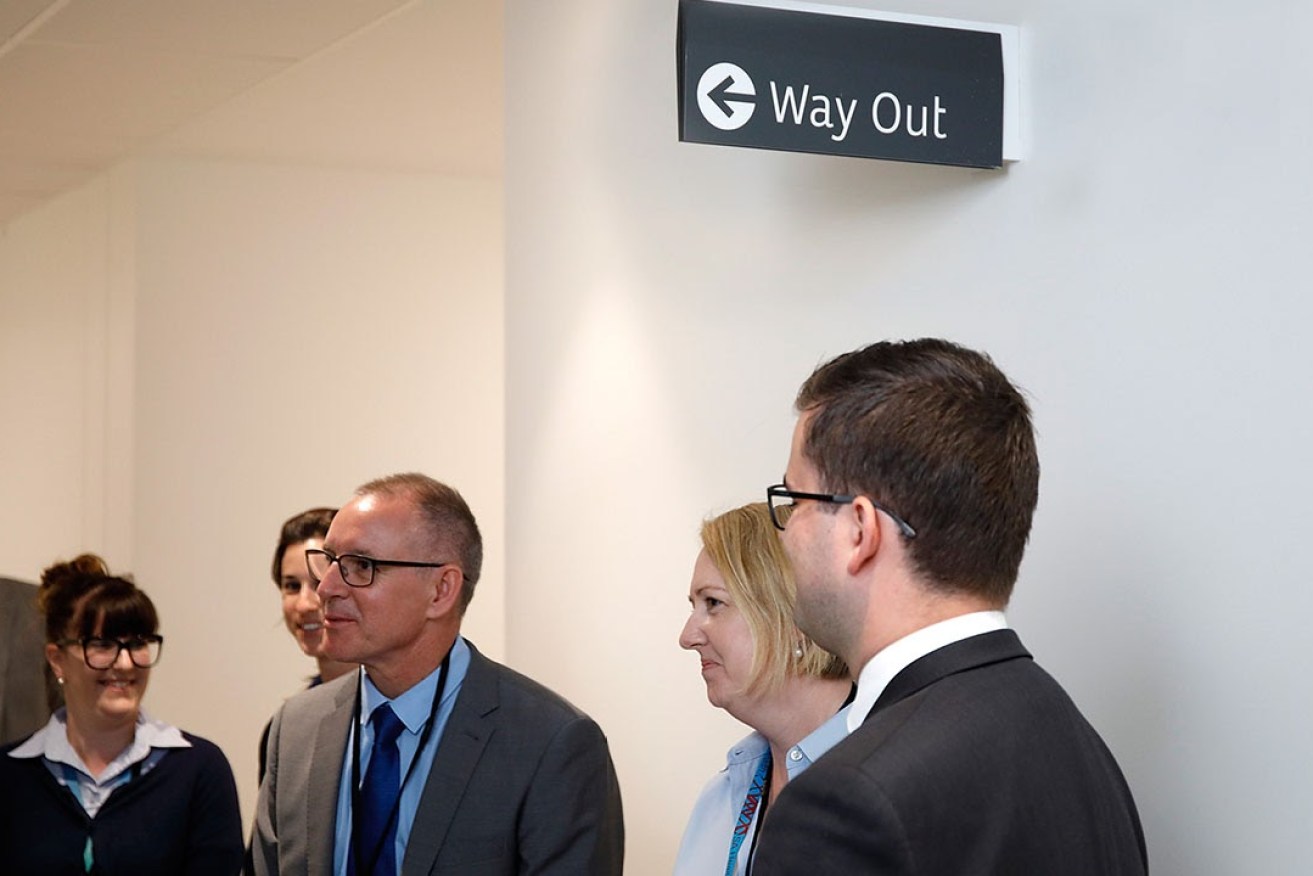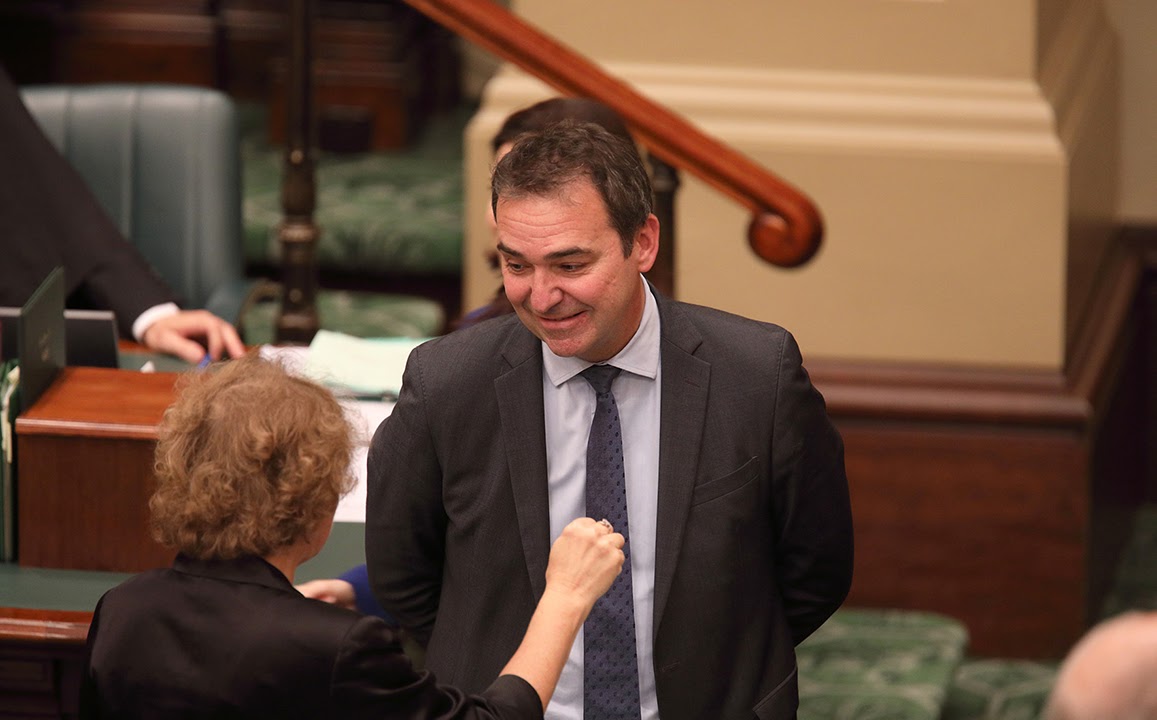Richardson: Parties take the knife to themselves
Ongoing internal politicking within both major parties is inflicting brand damage – right at the moment they need to be building trust, writes Tom Richardson.

Is Jay Weatherill on the way out? Photo: Tony Lewis / InDaily
If there is a question I get asked more than any other these days – from laypeople and political insiders alike – it is ‘who do you think will win the election?’
It is, sometimes, phrased as ‘what’s going to happen?’
And it’s not that I’m some oracle whose view on this matter will be in any way decisive.
I suspect people in political circles are asking pretty much everyone they meet the same question these days, seeking (variously) hope, reassurance or just a general snapshot of the public mood.
And the consensus appears to be thus: the Liberals, in the normal scheme of things, would form a parliamentary majority, given the new boundaries and assuming they maintain some semblance of their traditional advantage in the two-party vote, on which it has bettered Labor in six of the past seven elections.
But few at this stage doubt that SA Best, buoyed by Nick Xenophon’s Teflon brand, is set to make gains in SA, and to do so at the Liberals’ expense. So that long-longed-for parliamentary majority may come – if at all – at the whim of a popular and populist senator and his minions, and the Liberal Party could yet lose control of a swag of heartland seats in the Hills.
And, as the Liberals know better than most, when safe seats are lost to crossbench interlopers, they can be lost forever.

Steven Marshall will be farewelling Isobel Redmond – but will he also be farewelling her seat of Heysen? Photo: Tony Lewis / InDaily
You have to ponder at the ill-fortune of the state Liberal Party.
They finally get the electoral boundaries they believe could hand them victory in a two-horse race – and all of a sudden a third horse ambles up to the starting gate.
The ramifications of this are far-reaching.
In Nick Hornby’s book About A Boy, the protagonist breaks his life into units of time: one unit for taking a bath, two units for “web-based research”, four units for “having my hair carefully dishevelled”, and so on.
Election cycles can likewise be broken into specific units of time, and key themes emerge. Last year, in the shadow of the ongoing deliberations of the Electoral Districts Boundaries Commission, was effectively a battle for pole position in the lead-up to polling day. Since December, though, both major parties – having effectively established the rules of engagement – have been busily and chaotically dividing up the spoils before the battle.
While it is a necessary process, it is not an edifying one.
Labor may just have torched its own village with its needlessly over-complicated factional carve-up
At the very least, the Libs will need to pour hard-won resources into shoring up their vote in seats they should usually rely on winning easily. This is complicated by the fact that none of them – not one – will have an incumbent Liberal member.
All those seats that are vulnerable to Xenophon’s insurgence will be contested by fresh-faced wannabes – many of them very able, of course, but unable to rely on face or name recognition from local electors or to point to their achievements on behalf of the community.
As such, the likes of Heysen, Kavel, Davenport and Finniss will become the most intriguing of electoral battlegrounds.
Which makes it all the more strange that the party’s internal processes have appeared so chaotic. Amid calls for the leadership to intervene to ensure the right candidates are selected to contest winnable seats, the party insisted that it was a democracy in which anyone could put his or her hand up for preselection.
This ensured that some seats have become a spiteful free-for-all. But then, bizarrely, the party has intervened to block candidates in other seats, with a concerted challenge by the right’s Simon Le Poidevin in Morialta vetoed by the state executive and a prospective candidate in Kavel claiming he was dudded in a process that was neither free nor fair.
But while the Libs have been putting out spot fires, Labor may just have torched its own village with its needlessly over-complicated factional carve-up.
In a famously caustic film review of the Bruce Willis remake of The Jackal, the late Roger Ebert noted that the titular hitman “strikes me as the kind of overachiever who, assigned to kill a mosquito, would purchase contraband insecticides from Iraq and bring them into the United States by hot air balloon, distilling his drinking water from clouds and shooting birds for food”.
That’s kind of the approach Labor has taken to readjusting its lineup in the post-redistribution world.
Rather than just get the incumbent in the newly-renamed and re-aligned northern seat of King to suck it up and do some door-knocking, the factional chiefs have concocted a ludicrously overblown alternative, involving shifting one House of Assembly frontbencher into the Legislative Council, swapping a previous deal for a lower house preselection to the upper house but bumping the candidate up the ticket as a trade-off, and giving an impatient former state secretary a safe suburban seat while moving that seat’s incumbent into the neighbouring electorate on the grounds that most of his previous electorate has likewise been shifted across.
Oh, and then finding someone completely new to contest what is now nominally the party’s most marginal seat of King.
Are you with me so far?
There was just one problem: Frances Bedford, the long-time incumbent in Florey, into which Jack Snelling was to move to accommodate his buddy Michael Brown taking over Playford, decided not to retire, as had been broadly expected.
This was probably the moment at which a tactical retreat should have been called by Labor’s right faction.
That it did not do so will be a millstone that the party must bear until election day.
It has already suffered unwanted and unnecessary political damage from Bedford’s resignation from the party.
This was not helped by the tactful way in which Labor greeted her decision, with self-appointed spokesman for Snelling, Michael Atkinson, seemingly implying that Bedford was too old to be representing her electorate, noting “she’ll be 68 by the end of the next term” while Snelling is “20 years younger [and] has a young family to support”.
If Bedford ends up running as an independent in Florey, though, Labor – like the Libs in their Hills seats – will have to second precious resources into sandbagging a seat that it should be safely ticking off on the Red side of the pendulum.
If Bedford runs – and wins – it won’t cost Labor government per se (not even the most hopeful of conservatives could conceive of the left-wing maverick ordaining a Liberal administration), but at the very least it would cost the party a senior frontbencher and one time leadership hopeful.
And at worst, the resources that went into Florey could be the difference in securing a King, or Newland, or Lee (which Xenophon is also considered to be eyeing off).
But beyond all of that, the damage to the Labor brand is unmistakeable.
Bedford’s resignation reference to the ALP’s “faceless men” was damning and deliberate. The episode paints Labor as a party more preoccupied with its own internal machinations, with carving up its safe seats and rewarding factional mates, than with making a case for another four-year term.
More subtly, it smacks of a party whose powerbrokers are already preparing for a rebuild in Opposition, ensuring the right people are in the right seats to ensure the right succession.
In any case, it’s hardly the look Labor should be projecting a year out from an election in which they are still, somehow, in with a realistic shot at victory.
Their only consolation might be that the Liberals appear to be likewise turning what should be a fairly routine preselection process into a bloody civil war.
Which makes the answer to that perpetual question – what’s going to happen? – ever more befuddling.
And poses an even more pertinent one: whatever does happen on election day, what’s going to happen after that?
Tom Richardson is a senior reporter at InDaily.




